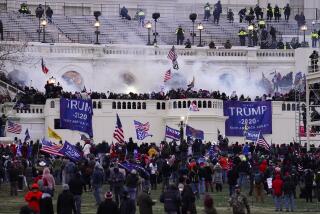Ruling Eases Prosecutors’ Task Before Grand Juries : Supreme Court: Evidence that might clear a suspect need not be revealed when federal indictment is sought.
WASHINGTON — The Supreme Court strengthened the power of federal prosecutors to seek criminal indictments Monday, ruling that they need not tell grand jurors of evidence that could show a suspect is not guilty.
The high court stressed that a grand jury is “an accusatory body” obliged to “hear only the prosecutor’s side.”
In so ruling, the court discounted arguments by some federal judges who have ruled that concealing evidence that could exonerate the target of a probe amounts to “prosecutorial misconduct.”
Neither a suspect nor his lawyer has a right to appear before a grand jury. If they have evidence proving innocence, however, they may present it during a trial, the 5-4 majority said.
Writing for the court, Justice Antonin Scalia said it is “quite absurd” to believe that a prosecutor has a duty “to alert the grand jury to the nature and extent of the available exculpatory evidence.” He referred to documents or testimony which could show the charges against the suspect are false.
But the four dissenters maintained that a grand jury should not be simply a rubber stamp for prosecutors. Instead, they said, a grand jury should function as an “informed” committee of ordinary citizens who can independently judge whether criminal charges are warranted.
“The real significance of this ruling is that innocent people can be indicted and then pay the enormous cost--personal and financial--to win an acquittal at trial,” said Los Angeles lawyer Dan Marmalefsky.
Monday’s ruling affects only federal courts. In many states, including California, state prosecutors have been required to tell grand jurors about substantial evidence that could clear a suspect of an accusation, lawyers said.
Federal prosecutors, by contrast, have traditionally enjoyed broad leeway to build a case against a suspect in a grand jury. In addition, grand jurors can undertake a sweeping investigation based “merely on suspicion that the law is being violated.”
The issue of a grand jury’s sweeping power has arisen most recently in Washington, where special counsel Malcolm R. Wilkey, acting at the behest of a grand jury, is gathering all House bank records to determine whether any U.S. representatives violated criminal statutes in the check-writing scandal.
Legal experts said they were not surprised by Monday’s ruling, since the court under Chief Justice William H. Rehnquist usually sides with prosecutors.
Moreover, the justices have rarely imposed limits on grand jury proceedings. For example, illegally obtained evidence can be used to persuade a grand jury to hand down an indictment, even though such evidence is excluded from trials.
But five federal appellate courts have ruled in recent years that judges should dismiss an indictment if it is based on false or misleading information. It is “prosecutorial misconduct,” these courts have said, if a U.S. attorney conceals from the grand jury evidence that would likely have caused the charges to be dismissed.
Monday’s ruling stemmed from the bank fraud indictment in 1988 of John H. Williams Jr., an Oklahoma businessman. He maintained that his financial statements and tax records showed that he had not deceived a local bank. Had this information been turned over to the grand jury, it would have cleared him of the charges, he said.
A federal judge in Tulsa agreed and dismissed the indictment. A federal appeals court in Denver upheld that decision two years ago.
But Bush Administration lawyers appealed to the Supreme Court, arguing that the prosecution of white-collar crime would be jeopardized if federal officials were required to reveal any documents that could exonerate the suspect.
Scalia’s opinion in U.S. vs. Williams, 90-1972, says federal judges “have no authority” to second-guess the actions of the prosecutors during the grand jury process. He was joined by Rehnquist and Justices Byron R. White, Anthony M. Kennedy and David H. Souter.
In dissent, Justice John Paul Stevens said the ruling represents a “sharp break with the traditional role of the federal judiciary” in restraining the power of the government.
“We do not protect the integrity and independence of the grand jury by closing our eyes to countless forms of prosecutorial misconduct that may occur inside the secrecy of the grand jury room,” Stevens said. Justices Sandra Day O’Connor, Harry A. Blackmun and Clarence Thomas joined the dissent.
* APPEALS HURDLE: A ruling makes it more difficult to reopen a criminal case. A22
More to Read
Sign up for Essential California
The most important California stories and recommendations in your inbox every morning.
You may occasionally receive promotional content from the Los Angeles Times.











